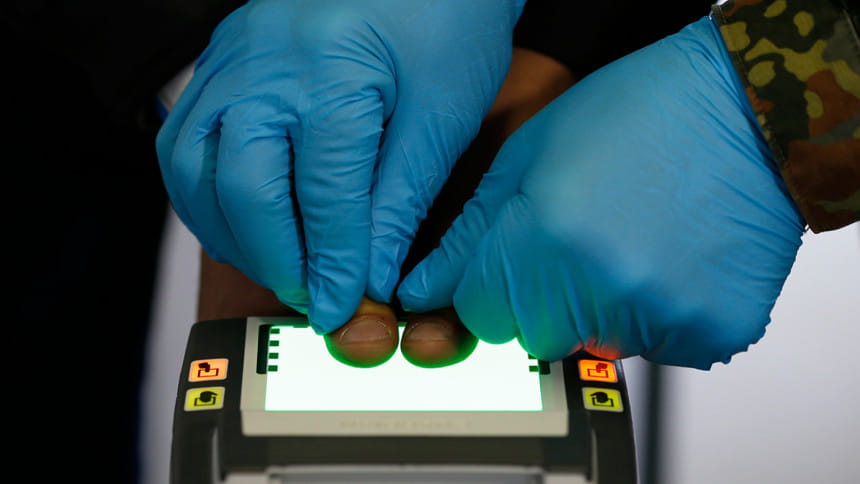HC questions legality

The High Court yesterday questioned the legality of the collection of fingerprints of mobile subscribers for SIM registration, in the wake of widespread criticism of the move and public fear of possible misuse of such personal data.
The court issued a rule on the authorities and asked them to explain in a week as to why the move should not be declared unlawful. The bench of Justice Syed Muhammad Dastagir Husain and Justice AKM Shahidul Huq fixed March 24 for further hearing.
The biometric registration began on December 16 last year after BTRC, the telecom regulator, issued an order in November. The government plans to complete the process by the end of next month, saying that the move would prevent crime and help catch miscreants.
But rights activists and the public in general are very wary that the fingerprints might fall into wrong hands and then misused because the data is being collected by mobile operators, not by the government.
Legal experts see this as privacy violation.
The government made the biometric registration process mandatory to keep the SIM cards active, but did little to dispel the fear, partly genuine and partly fueled by social media.
Although the government has repeatedly denied that mobile companies are storing fingerprints of users, four of the five private operators admitted last week that they were indeed doing exactly that.
Bangladesh Telecommunication Regulatory Commission issued its first order in this regard on November 11, asking operators to collect subscribers' fingerprints and send it to the Central Biometric Verification Monitoring Platform (CBVMP) of the BTRC.
The CBVMP is a database where the regulator plans to store all subscriber information collected through operators. But the BTRC is yet to set it up, which is why the mobile operators are storing the biometric data in their systems, officials said.
This sparked widespread criticism, and the regulator issued another order asking the operators to stop storing the fingerprints.
Operators now say they have destroyed all the fingerprints they collected and stored, although there is no way for the subscribers to know it for sure.
Talking to The Daily Star, several mobile users said their information might get leaked from the operators' database and then be utilised for malicious use, such as leaving their fingerprints in a crime scene.
But a BTRC official said such an apprehension was misplaced, as the data would be stored in digital codes and the BTRC alone could decode it.
In her efforts to assure the public, Tarana Halim, state minister for telecoms, said, “There is no scope to store users' fingerprints and if any operator does so, it will face tough consequences.”
She added that the fingerprints could not be used for any other purposes.
Contacted, a top BTRC official said there were some “blind spots” in the original directive and that the operators could exploit that.
Supporting him, an executive of a mobile operator said there was no common design for re-registration and that was why two operators started storing users' fingerprints first and two others followed them.
“These operators thought they can use this fingerprint database for innovations and offer new products as well like money transaction services using their phones,” said the executive.
Both the officials requested anonymity citing office protocol.
There are some 13.11 crore active SIM cards of one government and five private operators -- Teletalk, Grameenphone, Robi, Banglalink, Airtel and Citycell.
As of February, the six operators have re-registered about three crore SIM cards, BTRC sources said.
'NEGATIVE PROPAGANDA'
After yesterday's HC rule, the telecom division said they would reply to the query and try to convince the court of the need for the biometric registration for the accurate identification of the mobile phone users.
“We are facing a negative propaganda about the issue and hope the court will understand the situation after our reply,” said Tarana Halim in her reaction.
The HC rule came following hearing of a writ petition filed by Supreme Court lawyer SM Enamul Huq on March 9.
The petition contends that collection of such private information of citizens by mobile companies is not safe, Enamul's lawyer Mucktadir Rahman told The Daily Star.
There is no specific data protection law in the country and so the private telephone operators must be restrained from collecting citizens' fingerprints until a sufficiently secure system is introduced to protect personal data, he added.
Thirteen officials, including secretaries to the law, home and post and telecommunication ministries, Chief Election Commissioner, BTRC chairman and chief executive officers of six mobile companies, have been made respondents to the rule.
The telecom minister said they went for the decision of re-registration and information verification to confirm user identification, as most crimes happen through using mobile connections.
“Operators are verifying the fingerprints in real time and there is no scope to store users' fingerprints,” Tarana Halim insisted.
Many of the people running the “propaganda” against the regulator themselves have given their fingerprints at various times such as during immigration and visa collection, she added.

 For all latest news, follow The Daily Star's Google News channel.
For all latest news, follow The Daily Star's Google News channel. 








Comments